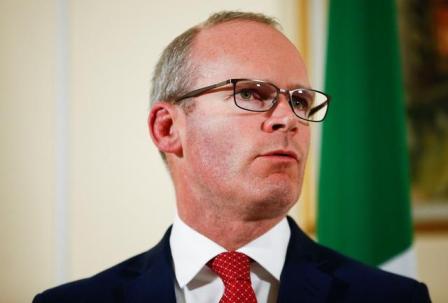DUBLIN – Ireland will step up its preparations for a disorderly Brexit this week given the chances of Britain leaving the European Union without a deal have never been higher, foreign minister Simon Coveney said on Monday.
With close trade links and a shared land border, Ireland is considered the most vulnerable among remaining EU members to Brexit and lawmakers passed one of the largest-ever pieces of legislation in March to prepare as best it could for a no deal.
Coveney said the updated contingency plan will “refine and improve” on the actions already in place for March 29 and April 12, the original Brexit deadlines before Britain was given an extension until the end of October.
“One of the biggest dangers Ireland faces in the weeks ahead is the ‘boy who cried wolf’ effect, whereby people and business assume that because a disorderly Brexit was averted in March and April the same will happen in October. To assume this would be a serious error,” Coveney wrote in the Irish Times.
“The chances of a disorderly Brexit have never been higher and the government now considers the risk of this outcome on October 31st as ‘significant’.”
How to manage the land border between EU-member Ireland and British-run Northern Ireland – including an emergency “backstop” solution to prevent the return of extensive controls – continues to be the most contentious part of a divorce deal the contenders to become the next British prime minister want renegotiated.
The backstop remains an absolute red line for Ireland, Prime Minister Leo Varadkar said on Monday, warning that there would also be a great deal of reluctance among EU leaders to grant Britain another extension in the talks.
Just as it did prior to the initial Brexit deadline, Ireland will likely come under pressure from fellow EU member states to detail how it would achieve its aim of keeping the 500 km border with Northern Ireland open even in a no-deal Brexit while also remaining a fully compliant member of the EU’s single market.
With Dublin continuing to work with the European Commission on how this could be achieved, Varadkar said reconciling those twin aims would be “very difficult” but possible and ultimately come back to keeping Irish and Northern Irish rules the same.
“We are looking at ways that we can do both. The solution is there and it’s in the withdrawal agreement and the backstop, fundamentally what’s required is regulatory alignment because technology doesn’t do it.”
REUTERS
R.S

